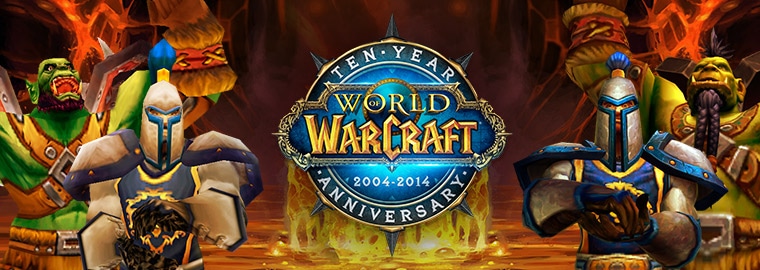
Featured Blog | This community-written post highlights the best of what the game industry has to offer. Read more like it on the Game Developer Blogs.
World of Warcraft: Ten Years of Change
It's World of Warcraft's tenth anniversary! The game has remained so popular (and profitable) not just because the team working on it is talented and dedicated, but also because they're not afraid of change.

It's World of Warcraft's tenth anniversary!

When I was asked to write down some thoughts about what the game and the team have accomplished, I immediately knew what I wanted to talk about: the flexibility and responsiveness of the development team. I don't think that gets enough attention and acclaim. The game has remained so popular (and profitable) not just because the team working on it is talented and dedicated, but also because they're not afraid of change. When you compare WoW today to the launch version, it's so different it could in some ways be considered a different game. This is interesting and important for two reasons.
First, one of the most challenging things to do in game development is to make changes to a live game, especially one that has been running for years and has accumulated vast numbers of players. Vast numbers of players doesn't just mean a lot of people; it also means vast amounts of player data. You're changing the tires on a moving vehicle. Yet despite the technical and design difficulties inherent in the process, the WoW team hasn't just made superficial changes to the game--they've made substantial, sweeping changes to even the most core systems.

Warlords of Draenor, the most recent expansion, includes the "stat squish," an epic quest to reset numbers that had become absurdly large over years of growth. The "stat squish" was a huge, gutsy undertaking even for an experienced team.
Second, not only has the WoW team been unafraid of even technically difficult changes, they've been unafraid of changes that alter the feel of the game. For example, they're redesigned the progression system multiple times, streamlining it each time to help make player choices more clear and understandable. That's not an easy change to make, and other MMO companies have failed when they tried similar initiatives.
Yet Blizzard doesn't just succeed--they succeed elegantly, both in terms of implementation and in terms of customer service. They explain the changes and their reasoning clearly, in a variety of methods of increasing depth (so an overview is available but you can also look at the exact numbers that changed if you crave detail). They take their time with the changes on test realms, giving themselves plenty of runway to ensure the changes are meeting their goals and also acceptable to the majority of their players.
Yes, these changes were also likely made to increase the influx of new players and/or decrease the rate of churn. We've all seen companies approach those goals in different ways, though. When you hear people discussing the success of WoW over the years, some say it's because they started so huge that even a normal churn rate means they can stay huge. I don't believe that's the case and in fact, I believe that diminishes the hard work and dedication of the WoW live team. Those huge, technically challenging changes are a big part of their sustained player base. They've made WoW more accessible, put a fresh coat of paint on the experience for even the most jaded players, and have been developed with a keen eye for how players spend their time in the game. The real feat they've accomplished goes beyond being unafraid of change: these large, difficult changes have been a clear indication that they consider the player experience paramount and they're willing to spend time and money continually honing that experience.
So cheers to ten years of WoW, but more important, kudos to a team and company that puts in the time and energy to put real meaning in the phrase "live game"!
About the Author(s)
You May Also Like














